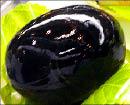Taiwanese food critics and gastronomists called a report on century eggs by an American on CNN’s iReport “unfair,” saying it undervalued the nature of the dish.
“Awful — it tastes like the devil cooked eggs for me. It tastes like something that used to be an egg, but made some really horrible choices,” the iReporter said of century eggs.
Danny Holwerda, a resident of Texas, wrote on iReport — a reserved site for bloggers on the CNN Web site — that the egg he had bought at an Asian supermarket was revolting and did not impress him.

Photo: Tang Chia-ling, Taipei Times
Century eggs, also known as pi dan (皮蛋), are made by wrapping the eggs of ducks and chickens in a mixture of clay, ash, salt and various traditional medicines for a period ranging from several weeks to several months.
Taiwanese gastronomist Fei Chi (費奇) said that although pi dan had the form of an egg, physical and chemical changes during the process changed the taste, which no longer resembled that of an egg.
The poor rating was because Holwerda did not know how to appreciate its taste, Fei said.
I will click “Like” for pi dan 100,000 times on Facebook, Fei said, adding that Holwerda’s criticism was “ridiculous.”
Food critic Tao Li-jun (陶禮君) was also surprised that pi dan had been labeled “the world’s most revolting food” and not zhu xie gao (豬血糕), which she said most foreigners, including many of her friends, are terrified of.
Zhu xie gao is made by mixing glutinous rice with pig’s blood, then steaming it until it congeals or deep frying it.
Tao said Holwerda had probably eaten pi dan without any condiments.
Tao also said pi dan with diced scallion, sesame oil or soy sauce made for a delicious dish and if it is eaten with chilled tofu in summer it is even tastier.
Food and Drug Administration Deputy Director-General Hsu Ming-neng (許銘能) said that although pi dan is not aesthetically pleasing, it did not mean it was unsanitary, adding that it is important there are no residual heavy metals in the dish.
There have been fewer discoveries of residual amounts of heavy metals in pi dan in recent years, Hsu said.
Cheng Yi-ping (鄭憶萍), section chief at the Tourism Bureau’s international travel division, said Taiwan respected the food preferences of people from other countries, but also urged foreign tourists to engage in an “adventure for the taste buds,” adding that the many specialty foods in the nation, including stinky tofu and zhu xie gao, are “Taiwan only” treats.
The food dispute prompted politicians to weigh in and some were not holding back their feelings about what they called the ignorance of Westerners.
Democratic Progressive Party (DPP) Legislator Tien Chiu-chin (田秋堇) said Western people should be “more courageous and willing to try new things.”
“Americans are chicken-hearted,” she said. “If they try the dish, they will love it as I do.”
TRANSLATED BY JAKE CHUNG, STAFF WRITER

Taiwanese can file complaints with the Tourism Administration to report travel agencies if their activities caused termination of a person’s citizenship, Mainland Affairs Council Minister Chiu Chui-cheng (邱垂正) said yesterday, after a podcaster highlighted a case in which a person’s citizenship was canceled for receiving a single-use Chinese passport to enter Russia. The council is aware of incidents in which people who signed up through Chinese travel agencies for tours of Russia were told they could obtain Russian visas and fast-track border clearance, Chiu told reporters on the sidelines of an event in Taipei. However, the travel agencies actually applied

Japanese footwear brand Onitsuka Tiger today issued a public apology and said it has suspended an employee amid allegations that the staff member discriminated against a Vietnamese customer at its Taipei 101 store. Posting on the social media platform Threads yesterday, a user said that an employee at the store said that “those shoes are very expensive” when her friend, who is a migrant worker from Vietnam, asked for assistance. The employee then ignored her until she asked again, to which she replied: "We don't have a size 37." The post had amassed nearly 26,000 likes and 916 comments as of this

New measures aimed at making Taiwan more attractive to foreign professionals came into effect this month, the National Development Council said yesterday. Among the changes, international students at Taiwanese universities would be able to work in Taiwan without a work permit in the two years after they graduate, explainer materials provided by the council said. In addition, foreign nationals who graduated from one of the world’s top 200 universities within the past five years can also apply for a two-year open work permit. Previously, those graduates would have needed to apply for a work permit using point-based criteria or have a Taiwanese company

The Shilin District Prosecutors’ Office yesterday indicted two Taiwanese and issued a wanted notice for Pete Liu (劉作虎), founder of Shenzhen-based smartphone manufacturer OnePlus Technology Co (萬普拉斯科技), for allegedly contravening the Act Governing Relations Between the People of the Taiwan Area and the Mainland Area (臺灣地區與大陸地區人民關係條例) by poaching 70 engineers in Taiwan. Liu allegedly traveled to Taiwan at the end of 2014 and met with a Taiwanese man surnamed Lin (林) to discuss establishing a mobile software research and development (R&D) team in Taiwan, prosecutors said. Without approval from the government, Lin, following Liu’s instructions, recruited more than 70 software